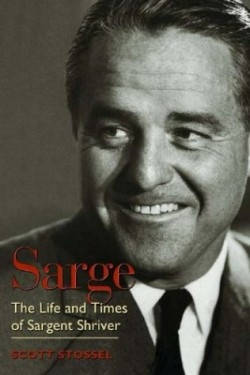Sarge
The Life and Times of Sargent Shriver
The Peace Corps, Head Start, Job Corps, VISTA, and the Special Olympics were some of the enduring New Frontier and Great Society legacies of the Kennedy and Johnson presidencies, 1960-1968. All of these public service programs were led by Sargent Shriver, who is most frequently remembered as the Democratic vice-presidential candidate on the McGovern/Shriver ticket, which was overwhelmed by Richard Nixon in 1972. The author, a senior editor of the Atlantic Monthly, demonstrates in this illuminating biography that this embarrassment pales when compared with Shriver’s achievements as a humanitarian and an important player in the Kennedy and Johnson administrations.
Shriver’s Catholic faith has guided his actions throughout his life and was instrumental in the creation of the Special Olympics, which he founded with his wife Eunice Kennedy. The Special Olympics changed the way Americans view the mentally challenged. Because they created an international event, Sarge and Eunice are the only husband and wife to be awarded individually the Presidential Medal of Freedom, the nation’s highest civilian honor.
Stossel is especially good at describing Shriver’s World War II service as a naval officer from 1941 to 1946. This true war hero fought in some of the South Pacific’s bloodiest sea battles, including the Battle of Santa Cruz. He suffered a near-fatal wound and more than half his division was killed or wounded.
The longest sections of the book include descriptions of Shriver’s remarkable work as the driven head of the Peace Corps under Kennedy and as the embattled director of the Office of Economic Opportunity under Johnson. Also prominently featured is Shriver’s complex, often combative relationship with the Kennedy family into which he married.
Being an in-law meant being relegated to second-class political status. The careers of Jack, Robert, and Ted came first, as Shriver experienced first-hand in 1960 and 1964. Joe Kennedy, the family patriarch, ended Shriver’s hopes of becoming Governor of Illinois when he required him to work on Jack’s presidential campaign. Four years later, Lyndon Johnson considered Shriver for vice president. However, says the author, on one occasion, Robert Kennedy grabbed Shriver by the collar and told him “that if any Kennedy was going to be vice president it would be me.” Robert and several other Kennedys were infuriated by Shriver’s decision to become a member of Johnson’s cabinet. The Kennedys loathed Johnson, seeing him as the usurper of their political throne.
Stossel’s writing has appeared in The New Yorker, The New Republic, and other publications; he is a frequent commentator on NPR, the BBC, and CNN. Here, he demonstrates that although Shriver’s opportunities for elected political office were frequently blocked by his in-laws, he was best suited for the appointed positions he held as head of some of the most important social programs of the 1960s. This masterful biography portrays the talented and idealistic Shriver as a first-rate executive for that era of great social change.
Reviewed by
Karl Helicher
Disclosure: This article is not an endorsement, but a review. The publisher of this book provided free copies of the book to have their book reviewed by a professional reviewer. No fee was paid by the publisher for this review. Foreword Reviews only recommends books that we love. Foreword Magazine, Inc. is disclosing this in accordance with the Federal Trade Commission’s 16 CFR, Part 255.

